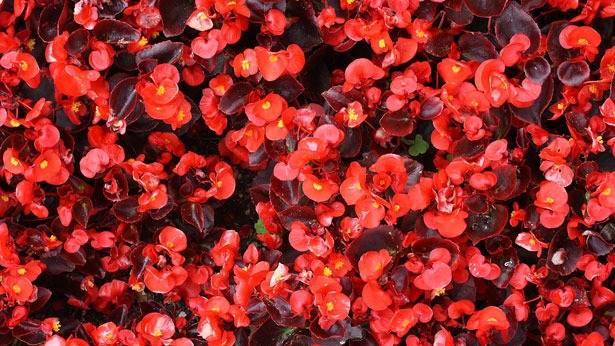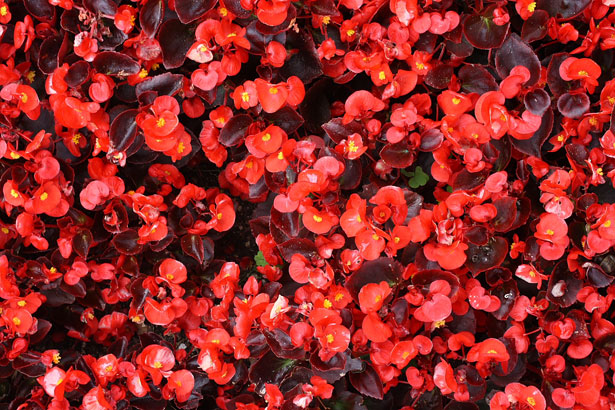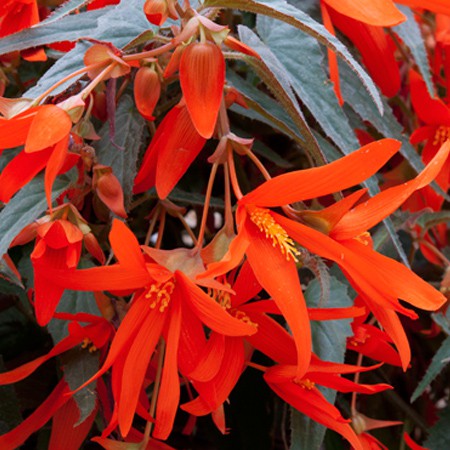Crop Tips: Begonias


Begonias are known for their brilliant flowers and fancy foliage. Begonias are relatively easy for the homeowner to take care of, whether they are planted indoors or outside. However, for the grower, each species of begonia has different cultural guidelines that need to be followed to ensure successful propagation and growth. Know the details and growing requirements of the begonia varieties that you are planning to grow and produce those crops that will perform best in your greenhouse environment.

The cultural guidelines below pertain to post-transplant of plugs and liners, not for plug or liner production. Cultural guidelines to consider:
Growing Medium
Begonias prefer a well-drained, well-aerated soilless medium that has good water retention. Growing media that are classified as ‘high porosity’, such as PRO-MIX® HP AGTIV® REACH™ or PRO-MIX® BKI, are the ideal products to use for growing begonias. These growing media are composed of sphagnum peat moss that will retain water and nutrients and professional-grade perlite and/or composted bark that provide drainage and aeration for the growing medium. Begonias grow well in a broad pH range but prefer more acidic media. For most varieties, the recommended starting and growing-on pH of the growing medium is 5.2 – 6.0.
Watering
It is always recommended to complete a comprehensive water analysis (alkalinity, EC, pH and potential nutrients) before beginning production. Water quality has a direct influence on the availability of nutrients and pH of the growing medium. As a result, water tests are used to design fertilizer programs for crops, including begonias.
Watering frequency often impacts the quality and shrink of a begonia crop as many are sensitive to root rot. It is important to maintain moderate moisture in the growing medium, but avoid both significant dry down and extended periods where the growing medium stays wet, especially in poor weather conditions. The latter is especially problematic for newly transplanted begonias as they are most sensitive to wet growing media.
To prevent water spotting or burning of the leaves on sunny days, it is best to water earlier in the morning or later in the afternoon.
Fertilization/Nutrition
A fertilization program should consider some general nutritional guidelines, such as providing the correct amount of acidification or buffering for the water to maintain a correct growing medium pH, the correct nitrate-N formulation, avoiding excessive EC build-up in the root zone and providing the correct balance of macronutrients and micronutrients for optimal plant growth.
Most begonias are fertilized at a constant rate of 75 - 150 ppm Nitrogen. The optimal EC, or soluble salt level, of the growing medium is 0.5 - 1.3 mmhos/cm. Leach using clear water if soluble salt tests indicate that EC is too high to prevent damage to the root system and leaves. Generally speaking, large-flowered tuberous begonias and small fibrous begonias prefer lower fertilizer application rates and EC, while aggressive hybrids such as boliviensis and other larger hybrids require higher fertilizer application rates.


Potential Problems
There should be little occurrence of disease if basic cultural guidelines and practices are followed. But as stated above, begonias are sensitive to overwatering and are susceptible to root and stem rot caused by Pythium, Phytophthora or Rhizoctonia. Allow the growing medium to dry down quickly between irrigations, especially with newly transplanted plants, by growing at higher temperatures (above 70°F or 21°C), increasing airflow or restricting the quantity of water applied. Use of PRO-MIX® HP AGTIV® REACH™ or PRO-MIX® HP® BIOFUNGICIDE™* + MYCORRHIZAE™ will provide natural biological controls to help further suppress root disease organisms.
Begonias are also sensitive to botrytis and powdery mildew. It is best to control humidity, increase airflow, grow at warm temperatures and water only early in the day to reduce the potential for these diseases. Begonias can also have some problems with insects such as Begonia Mite, fungus gnats, aphids and thrips. Scout and use appropriate controls to treat targeted insects.